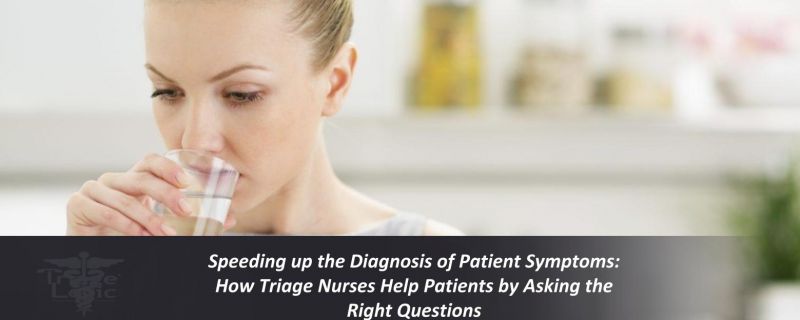Speeding up the Diagnosis of Patient Symptoms: How Triage Nurses Help Patients by Asking the Right Questions
Telephone nurse triage plays a critical role in making sure that patients are given the correct level of care when they call. This requires following strict guidelines established through Schmitt-Thompson protocols, in which the nurse asks certain questions beginning with the most emergent symptoms. In some cases, a nurse will go above and beyond a typical triage call and we will highlight them as a Nurse Hero. In the following case, we highlight the work of Tina, a triage nurse who was able to go beyond standard protocols and figure out the reason why a patient was having the symptoms he called about. This allowed the patient to get the quick intervention he needed to save his health. It was because Tina, a TriageLogic nurse, knew exactly what questions to ask that she became this week’s Nurse Hero.
The Call
During her shift, Tina received a call from a patient who stated he woke up and his lips were very swollen. He was concerned about an allergic reaction from eating chicken and potato salad from the store.
The caller’s wife was in Hawaii on vacation with some friends, so he had been eating off the potato salad for a couple days. He had noticed hives two days ago, but didn’t think much of it until his lips swelled up.
The Protocol
At this point, Tina went to the normal protocol for an allergic reaction. In the TriageLogic protocol software it states that if there is widespread hives, itching or facial swelling and the onset has been greater than two hours since exposure to the high-risk allergen the caller should go to the ED.
Often with this protocol, a nurse will not typically invest a lot of time into the caller’s history in lieu of rapid intervention. Tina, however, knew the patient was safe since he had no report of difficult breathing or tongue thickening. Tina decided to go the extra step to evaluate the whole scenario and asked the caller about previous allergic responses and medications he was taking.
The Problem
Pulling on her previous nursing experience, Tina paid close attention to his medications and asked him to spell the names of what he was taking. When the patient retrieved the bottle he said, “Oh it appears I am taking my wife’s medication and she has mine in Hawaii.” Tina knew that an ACE inhibitor can cause swelling of the lips and how it can cause many other complications if not intervened rapidly.
Tina is our Nurse Hero because she not only knew what to ask the caller, but she knew how critical the answer was and sent the patient to the ED for the right reasons with the correct advice. Had the patient wife’s medication. Or, in a worse scenario, the patient may have thought his reaction was just to the food and had dire consequences if he did not get to the ED in time for intervention.
This story illustrates the power that nurse triage has to help educate patients and get them to the right level of care. Not only do triage nurses reduce phone calls to doctors, but they also allow your patients to rest easy knowing that their provider has given them access to a medical professional who is trained to look for serious medical symptoms. If your practice would like to provide your patients with an after-hours nurse triage service or ensure that your nurses are able to ask the right questions every time, contact us or set up a demo to see if TriageLogic will work for you.






